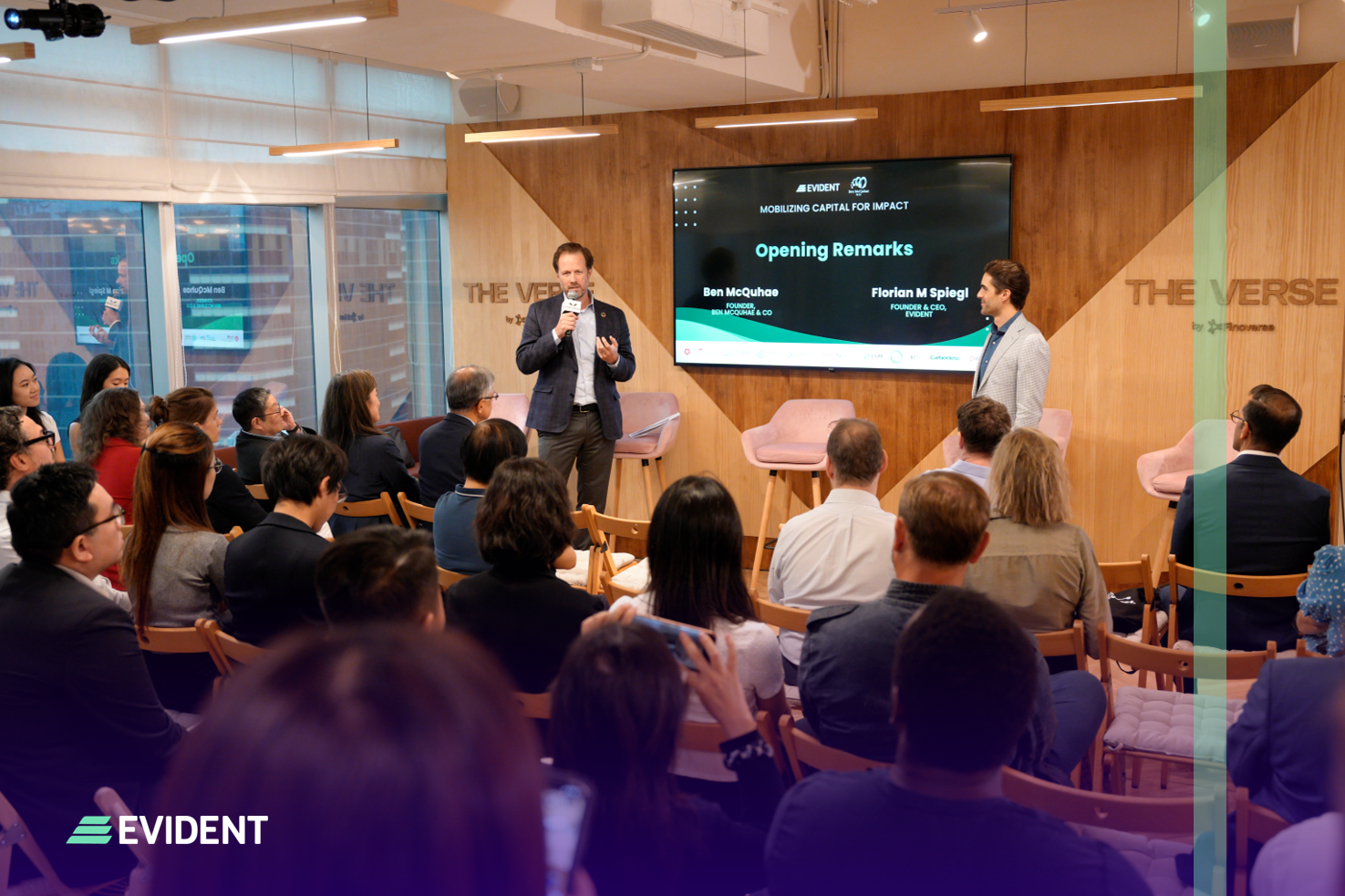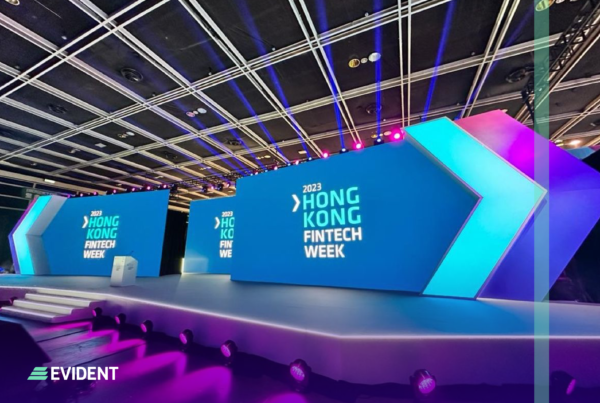EVIDENT and Ben McQuhae & Co recently collaborated to host an impactful event focused on directing capital toward impact investing and sustainability objectives. Titled “Mobilizing Capital for Impact: Public Finance, Private Capital, Technology & Governance”, the event convened leading experts across sectors to engage in thought-provoking dialogue on the future of values-driven investing.
Setting the Stage with a Welcome and Opening Remarks

The event kicked off with welcoming remarks from King Leung, Head of Finance & FinTech at InvestHK. In his speech, Leung highlighted Hong Kong’s ambition to establish itself as a major international finance and fintech hub. He went on to explain how decentralized networks like DPIN (decentralized physical infrastructure networks) could help advance these goals through innovations such as connecting solar energy producers directly to the electrical grid to enable distributed renewable energy generation. Leung also noted the significant manufacturing capabilities present in the nearby Greater Bay Area, including the ability to produce affordable Internet of Things devices on a massive scale. He suggested these could be utilized for emissions tracking and other sustainability applications. In summary, Leung’s remarks indicated Hong Kong possesses strong potential to lead in the green fintech space by bringing together its established finance industry, burgeoning tech innovation ecosystem, and growing blockchain networks.
Subsequent opening remarks were delivered by Ben McQuhae of BMQ and Florian Spiegl, Founder & CEO of EVIDENT. McQuhae characterized the event as an opportunity to catalyze an ongoing dynamic conversation about solving immense challenges such as climate change. He emphasized the need to foster greater collaboration across sectors and find synergies between emerging concepts such as sustainability, ESG metrics, green technology, and blockchain-enabled tokenization. Both speakers reiterated the event’s focus on moving past theoretical discussions to sharing concrete examples, fresh perspectives, and pragmatic optimism on capital deployment opportunities that drive impact.
Panel Discussion 1: “Mobilizing More Money for Impact: Public Finance meets Private Capital”

The first-panel session delved into topics around more effectively mobilizing capital flows towards impact investing and sustainability. It was moderated by Ben McQuhae of BMQ and featured perspectives from Alexandra Tracy of Carbonless Asia, Sandeep Sethi of FTAHK, Jessica Ha of BMQ, and Isabella Kong of ERM.
Alexandra Tracy of Carbonless Asia emphasized that “what’s maybe more important is to understand what it is we’re trying to achieve, and whether there is a difference between valuation and values.” She noted that ESG and impact investing both aim to utilize investment for positive outcomes.
Sandeep Sethi cited examples of corporations beginning to access “transition finance” for sustainability improvements. He explained, “CLP has raised over the last few years, I’m not mistaken, 1.15 billion US dollars across three tranches for transmission finance, and they’ve used it for gas power plants.” This shift from coal to lower-emission natural gas demonstrates the potential of transition finance structures.
Jessica Ha provided context on mobilizing private investment, stating, “We have an I guess we there are lots of people who are, you know, very experienced in finance market practitioners. We also have, you know, I guess, newer, younger generations of professionals for whom sort of impact and sustainability, you know, it’s probably more hardwired into their sort of career choices.”
Isabella Kong shared an on-the-ground perspective stemming from her work providing grant funding to ClearBOX, a startup using technology to reduce marine plastic waste pollution in locations such as Hong Kong and India. She emphasized how this illustrated the tangible impact that can be achieved and quantified through thoughtful investment approaches.
Special Fireside The Mikro Kapital Journey and the Future of Inclusive Finance by Tokenizing Impact

Mikro Kapital’s Michele Mattioda engaged in an insightful dialogue with EVIDENT’s Florian Spiegl centered on Mikro Kapital’s extensive microfinance efforts and explorations of blockchain technology.
Mattioda provided context on Mikro Kapital’s lending operations and impact: “By the way, we have 260 offices on site effectively towards nine countries. And the added value that we bring from micro capital in comparison to other traditional asset manager in Luxembourg, we are which are sitting on a financial financial knowledge on how to manage alternative investment. We are more much more similar to a holding structure.”
He also explained their lending criteria and impact goals: “we analyze other parameters. Aside of the traditional banks, we look at the cash flow that you generate. We look at your warehouse rotation, we look at your profitability of the business, and if there is space, we’ll lend you the money. Our goal is to make you in a to improve your financial knowledge to improve your way of doing financial sheet and by balance sheet to report to pay your taxes correctly to open your bank account and be able to become bankable.” He also reiterated that their ideal outcome is to have clients only once, as this is a KPI for their success. In a sense they aim to lose their clients after having provided initial capital to get their business started and established.
On tokenization Mattioda stated: “So we started to think and to materialize an idea of decentralizing the banking system. And here where the collaboration with BitFinex started basically. So what we had is they came up and said, look, we are looking to find an issuer for real assets token real, tangible assets token tokenization project and would you be interested to do something together and say, okay, blockchain technology, which not only crypto can bring several benefits to our business model.”
He also provided examples of potential benefits: “the ultimate goal is to disperse loans to local enterpreneurs also and also in crypto. So they will even not need a bank account eventually to utilize that and the they can transfer easily and just convert into hard currency where it’s necessary.”
Panel Discussion 2: “Living in the Future Today: Concrete Tech Applications Revolutionizing Impact Investing”

The second-panel session explored technology’s transformative potential to reinvent sustainable investing, moderated by Victor Yim of Cyberport.
Julien Martin provided extensive perspective on blockchain’s potential to increase access and reduce costs for smaller scale green bond offerings. He explained how blockchain solutions can facilitate financing for distributed, small-ticket climate solutions like solar installations that are currently underserved by traditional institutional capital markets.
Florian Spiegl outlined an intriguing tokenization pilot that enabled shared ownership of a shipping vessel in small fractions. This unlocked investment from regular individuals rather than just institutions, providing the capital needed to fund transitioning the ship to use lower-emission LNG fuel rather than higher-polluting bunker fuel. Spiegl positioned this as a creative example of mobilizing technology to drive incremental sustainability improvements even in immense, challenging-to-decarbonize industries like global shipping.
Elsa Pau made a compelling case for the vast untapped potential of channeling widespread mainstream retail investor capital towards funding social and environmental causes. She envisioned microfinance-inspired financial inclusion models that allow ordinary citizens to directly support values-based initiatives. Pau stated tokenization and other blockchain innovations could facilitate this democratization and disintermediation of investing in public good.
Jenny Lee provided perspective arising from her leadership role in the Hong Kong Green Finance Association, including their efforts to develop clear sustainable finance taxonomy and standards. She explained these initiatives aim to bring greater coherence and transparency to the rapidly growing sustainable investment marketplace, thereby preventing misleading “greenwashing” claims.
Ben McQuhae drew upon his extensive experience advising both traditional financial institutions and disruptive startups to highlight the critical need for clear standards and definitions in this still nascent space. He explained why this is integral to provide comfort to regulators who must assess and approve new digital asset classes that can expand options for sustainability investment.
Victor Yim shared his technology expertise-driven view that ongoing leaps in artificial intelligence capabilities, including generative machine learning models, could prove even more profoundly disruptive than blockchain for unlocking entirely new models of impact investing and sustainability finance.
Key Takeaways and Path Forward
Several key themes emerged across the wide-ranging panels and discussions. These included leverage points such as blockchain, tokenization and decentralized technologies that can lower costs and frictions to investing while expanding access. Speakers emphasized education on how to prudently direct more retail capital towards impact. Multiple examples were cited of real-world transition finance driving incremental but meaningful sustainability improvements in challenging industries. Speakers also cited the need for clear standards and taxonomies to avoid greenwashing as the market grows.
While formidable challenges remain, the vibrant exchange of ideas and concrete initiatives underway provide ample reason for optimism. Events like this that facilitate insight sharing and new partnerships across finance, technology, industry and other realms are important to co-create the future, one in which investment consciously catalyzes positive impact.







